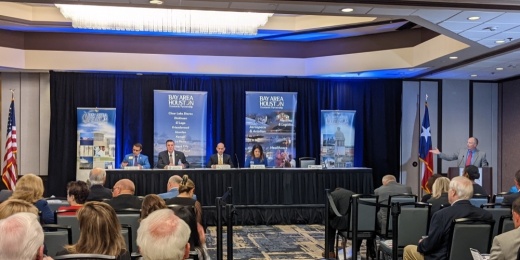A special session begins July 8 to wrap up work legislators did not finish during the regular session.
San Jacinto College Chancellor Brenda Hellyer moderated a panel where she asked Sen. Carol Alvarado, D-Houston; Rep. Dennis Paul, R-Houston; Rep. Greg Bonnen, R-Friendswood; Rep. Mary Ann Perez, D-Houston; and Rep. Briscoe Cain, R-Deer Park, various questions about the session. Sen. Larry Taylor, R-Friendswood, was supposed to appear but was called away last minute by Gov. Greg Abbott.
Q: Senate Bill 900 pertains to above-ground storage. How will this bill affect our community?
A: This bill came as a result of the 2019 ITC fire in Deer Park. During investigation, the state learned it did not have much regulation of above-ground storage tanks, Alvarado said.
The bill directs the Texas Commission on Environmental Quality to create a standard program companies will have to abide by. Certain rules the bill creates would have possibly shortened the time the ITC fire burned or stopped it from happening at all had it been in place two years ago, Alvarado said.
Q: Senate Bill 383 pertains to memory care and Alzheimer’s. What does this bill do, and who does it protect?
A: Texas has over 400,000 residents with Alzheimer’s and ranks second in the United States for Alzheimer’s deaths. With this bill, memory care facilities can choose to obtain state certification to specifically care for these patients, Perez said.
With this bill, residents will be able to know at a glance whether a facility will provide the care their Alzheimer’s-affected family members need. Still, the bill doesn’t go far enough to address the problem, she said.
"It’s certainly a good start," Perez said.
Q: What was in the state’s budget this year, and how does it affect us?
A: The budget turned out extremely well, much to the benefit ... of our whole community, said Bonnen, who chaired the finance committee this session.
A year ago, legislators had a deep concern because there was a projected $4.5 billion short to close out along with an expected shortfall of $20 billion for the following budget. Despite the challenges, legislators passed a balanced budget, Bonnen said.
Historic House Bill 3, which passed in the 2019 session, was fully funded under this new $246 billion budget. The budget also funded higher education, NASA support and a couple hundred million dollars for the coastal spine. Over $16 billion in federal relief due to COVID-19 helped balance things, Bonnen said.
“We started with such ... concern for the fiscal position of state that to end where we did was huge,” he said.
Passing a budget is the one thing legislators are constitutionally obligated to do. The budget received near unanimous support in the House and Senate, Bonnen said.
Other legislators commended Bonnen for his leadership.
“They could have not anyone better to chair that committee,” Perez said.
Q: What will the Coastal Barrier Protection District do for the Bay Area?
The Bay Area Houston Economic Partnership has fought for years for this district, Paul said.
The federal government needs the district to contract with and to be a local sponsor if the feds funds the coastal barrier—a project that’s been planned for 13 years, Paul said.
“The feds said, ‘If you don’t take care of this, we’re not going to give you any money,’” Paul said.
The district includes 11 board members—six appointed by Abbott, and another five appointed by the counties included in the district: Harris, Galveston, Jefferson, Chambers and Orange. Abbott appointed BAHEP President Bob Mitchell as one of the district’s board members, Paul said.
One catastrophic storm would pay for the cost to fund the barrier, which is pegged at about $26 billion. Repairs after Hurricane Ike cost the region $30 billion, Paul said.
“This will be the largest single engineering project the federal government has ever done,” he said.
Q: Senate Bill 678 is centered around a small business disaster recovery loan program. What does it do?
A: This bill came after Alvarado recognized small businesses were hurting from the COVID-19 pandemic or, in some cases, Hurricane Harvey. Small business revenue in Harris County decreased 36% during the pandemic, and the number of small businesses decreased by 32%, Alvarado said.
“There’s a lot of need,” she said.
Help from Washington D.C. can be slow to trickle down, so this bill sets up the infrastructure for a fund small businesses can use to recover from emergencies, Alvarado said.
Finances are tight, so no money was put in the fund, but now it is “teed up” in case it is needed later, she said.
Q: A bill related to credit card skimmers at gas pumps passed. What does this mean for residents using credit cards when getting gas?
A: House Bill 2106 started as a very large bill affecting many people, from residents to fuel companies to banks. In the end, it came out with 100% support, which is not easy to do, Perez said.
It takes seconds for criminals to install skimming devices at gas pumps capable of stealing credit card info 30-100 times a day. The bill establishes a financial crimes intelligence center at a cost of $3 million to combat these crimes, Perez said.
Q: What was done to reform the Electric Reliability Council of Texas after the winter freeze?
A: Legislators passed several bills related to this, Paul said.
Senate Bill 2 revamps how the ERCOT board is set up and appointed. Board members have to be Texans now; no more out-of-state people can serve on it, Paul said.
Additionally, if you make money from the grid, you can’t be on the board, he said.
Senate Bill 3 was a response to dealing with issues from the storm, including winterizing equipment, mastering rolling blackouts and more. Protections were put in place to ensure hospitals and retirement homes are listed as critical agencies and always have power, Paul said.
Small bills, such as House Bills 16 and 17, protect consumers from high electricity bills and protect consumer choice of electric companies, Paul said.





